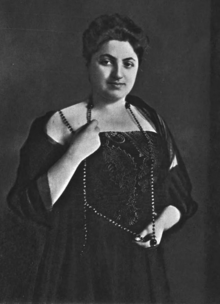Frances Wilson Huard
Frances Wilson Huard (October 2, 1885 – February 1969) was an American-born writer, translator, and lecturer who wrote memoirs of life during World War I in France.

.jpg)
Early life
Frances Barrie Wilson was the daughter of comic actor Francis Wilson and his first wife, actress Mira Barrie.[1]
Career
Huard is best known for her memoirs, My Home in the Field of Honour (1916),[2] and My Home in the Field of Mercy (1917), both about living in France during World War I. Her husband Charles Huard, a French artist, provided illustrations for her books. She described turning their summer estate at Villiers, near Soissons, into a hospital,[3][4] riding a bicycle after her horses were requisitioned, and managing a household under wartime conditions. In one incident, rather than waking the young men assigned for late night guard duty, she (and her dogs) went in their stead:
"Poor little chaps, it seemed a pity to wake them, but what was to be done? Presently an idea of replacing them myself dawned upon me: a second later it so enchanted me that I wouldn't have had them wake for anything. The whole thing was beginning to be terribly romantic. Slipping quietly away, I went to my room and got my revolver, and then going to the south front of the château, I softly whistled for my dogs... With these five as bodyguard I sauntered up the road in the brilliant moonlight, arriving in front of the town hall just as the clock was striking eleven."[2]
Her home was damaged by bombs and occupied by German troops. Later in the war, she ran a hospital in Paris.[5] During and after the war, she toured the United States and Canada as a lecturer and sold her husband's etchings to raise funds for post-war relief.[6][7][8]
Other works by Huard were With Those Who Wait (1918),[9] Lilies, White and Red (1919, a book of short fiction),[10] American Footprints in Paris (1921, co-authored with François Boucher),[11] and a biography of her husband, Charles Huard, 1874-1965 (1969).[12]
She also translated Maurice Barrès' novel Colette Baudoche (1918),[13] Marcel Nadaud's The Flying Poilu: A Story of Aerial Warfare (1918), Alfred de Vigny's Military Servitude and Grandeur (1919), and Paul Arène's The Golden Goat (1921) into English.[14] She wrote essays from France for American publications, including The Century, The Bookman,[15] and Scribner's Magazine.[16]
Her American family feared for her safety in France again during World War II.[17]
Personal life
Frances Wilson married artist Charles Adolphe Huard in 1905.[18] She was widowed when he died in 1965, at their home in Poncey-sur-l'Ignon. She died in 1969, aged 84 years.
References
- "Francis Wilson, 81, Noted Actor, Dead" New York Times (October 8, 1935): 23. via ProQuest
- Huard, Frances Wilson (1916). My Home in the Field of Honour. Drawings by Charles Huard. George H. Doran Company. p. 89.
- Cardinal, Agnès; Goldman, Dorothy; Hattaway, Judith, eds. (1999). Women's Writing on the First World War. Oxford University Press. p. 209. ISBN 9780198122807.
- Huard, Frances Wilson (November 20, 1918). "Madame Huard Pays Sincere Tribute to Marines Who Saved Her Home from the Huns". The Marines' Bulletin. 1 (1): Nine.
- "Baroness Here to Lecture for Hospital Fund". San Francisco Chronicle. January 20, 1919. p. 7 – via Newspapers.com.
- "La Baronne Huard". The Bellman. Vol. 22 no. 547. February 10, 1917. p. 162.
- "Baroness Huard Lectures: Francis Wilson's Daughter Tells French Views of Americans" (PDF). The New York Times. February 2, 1920. p. 3.
- "Public Invited by Woman's Club". The Brattleboro Daily Reformer. March 21, 1919. p. 5 – via Newspapers.com.
- Huard, Frances Wilson (1918). With Those Who Wait. With drawings by Charles Huard. McClelland, Goodchild & Stewart. ISBN 0665859791.
- Huard, Frances Wilson (1919). Lilies, White and Red. George H. Doran copmany.
- Boucher, François; Huard, Frances Wilson (1921). American Footprints in Paris. George H. Doran Company.
- Huard, Frances Wilson (1969). Charles Huard, 1874-1965. A. Michael.
- Barrès, Maurice (1918). Colette Baudoche: The Story of a Young Girl of Metz. Translated by Huard, Frances Wilson. George H. Doran Company. LCCN 18018959.
- The Online Books Page for Frances Wilson Huard, Online Books, University of Pennsylvania Library.
- Huard, Frances Wilson (October 1918). "The Institute of France". The Bookman. 48: 147–154.
- Huard, Frances Wilson (July 1922). "A Season in Montmartre". Scribner's Magazine. Vol. 72 no. 1. Illustrations by Charles Huard. pp. 29–41.
- "Daughter, Like Her Mother, Weds Leading Man In Cast". The Baltimore Sun. June 5, 1942. p. 6 – via Newspapers.com.
- MacChesney, Clara T. (August 10, 1913). "A Visit to Charles Huard, the French Illustrator" (PDF). The New York Times. p. M13.